|
|
|
Sort Order |
|
|
|
Items / Page
|
|
|
|
|
|
|
| Srl | Item |
| 1 |
ID:
078705
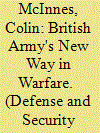

|
|
|
| 2 |
ID:
086624
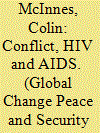

|
|
|
|
|
| Publication |
2009.
|
| Summary/Abstract |
The argument that there is a link between conflict and the spread of HIV has become commonplace in both the academic and policy world. This article examines five key reasons offered for this link: the high HIV prevalence in many militaries; that conflict leads to migration which acts as a vector for the spread of the disease; the changes in sexual behaviour introduced by conflict, including increased incidence of rape; reduced health provision and support as a result of conflict; and the risks introduced in post-conflict settings. The article argues that these reasons offer a poor explanation as to why HIV is spread in some conflicts but not others and develops a new model to explain when conflict might lead to the spread of HIV.
|
|
|
|
|
|
|
|
|
|
|
|
|
|
|
|
| 3 |
ID:
144241
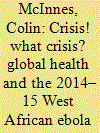

|
|
|
|
|
| Summary/Abstract |
This article examines why the 2014–15 outbreak of Ebola in West Africa, which subsequently spread more widely, was understood as a crisis. It begins from the basis that there was nothing ‘natural’ about it being considered a crisis; rather it was socially constructed as such. Specifically it suggests that the outbreak could be understood as a crisis because of the way in which it resonated with the global health narrative. The article examines how the elements which constitute this narrative – the effects of globalisation, the emergence of new risks and the requirement for new political responses – are fundamental to how Ebola was understood as a crisis.
|
|
|
|
|
|
|
|
|
|
|
|
|
|
|
|
| 4 |
ID:
157970
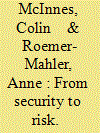

|
|
|
|
|
| Summary/Abstract |
The rise of health issues such as HIV, pandemic influenza and Ebola on international agendas has led to the framing of threats to health as security issues. This has created an uneasy relationship between politics and health, by moving national interests into an area traditionally dominated by scientific rationalities and a predisposition towards cosmopolitan norms. Framing global health threats as risks, however, appears to be less politically charged and divisive, combining an aura of scientific objectivity with a moral call to action. In this article we argue that, despite its technical use in public health, in the policy discourse on global health the risk frame is not immune to values and interests but inherently political. It privileges a specific approach to global health policy which focuses on potential future catastrophes rather than presently existing health problems, emphasizes technological solutions rather than addressing the socio-economic determinants of health, while there is no single risk frame, but rather multiple risk frames existing simultaneously, as seen during the 2014–15 west African Ebola outbreak. However, framing health in terms of risk is useful in understanding how health issues reflect and contribute to the wider Zeitgeist concerning societal vulnerability: that dangers exist which are uncontrollable and are the product of technical progress. The risk frame allows us to place health issues into this wider context, where disease is just one of a number of concurrent dangers, rather than a separately identifiable hazard.
|
|
|
|
|
|
|
|
|
|
|
|
|
|
|
|
| 5 |
ID:
141059
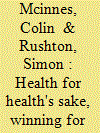

|
|
|
|
|
| Summary/Abstract |
Ideas of smart power and Global Health Diplomacy have developed considerable prominence over the past decade in, respectively, the foreign policy and public health communities. Although in some respects separate, both suggest the potential for using health assistance to generate political as well as health benefits. The conflicts in Iraq and Afghanistan provide an opportunity to examine these assertions at the ‘sharp end’. We consider both the health and wider strategic benefits of health assistance in these conflicts, as well as some of the ethical challenges involved. We conclude however that we should adopt the precautionary principle because: there is doubt over the quality of health services provided in such circumstances; concern over the wider effects of politicising health aid; and little proof that the claimed strategic benefits materialise in practice.
|
|
|
|
|
|
|
|
|
|
|
|
|
|
|
|
| 6 |
ID:
069739
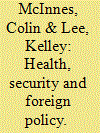

|
|
|
| 7 |
ID:
102425
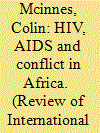

|
|
|
|
|
| Publication |
2011.
|
| Summary/Abstract |
The causes and consequences of HIV and AIDS are social are well as biomedical. Given the scale of the pandemic, understanding the social dimensions of HIV and AIDS is vital. One key argument is that there is a link between conflict and the spread of HIV. This appears to be particularly the case for sub-Saharan Africa where high levels of HIV prevalence are matched by violent conflict and state instability. Recent evidence however suggests that HIV prevalence does not always increase in conflict and that in some instances it may even reduce. This article attempts to explain why HIV has not increased in some sub-Saharan conflicts. To do this it moves beyond the use of risk factors to offer a new explanation based on susceptibility and vulnerability. It uses this explanation to examine four cases - Sierra Leone, Angola, Rwanda and the Democratic Republic of the Congo (DRC) - where conflict did not lead to a significant increase in the prevalence of HIV. The article concludes that, despite the fears of a few years ago, conflict does not readily act as a vector for the spread of HIV, though the potential for this to occur does still exist under certain circumstances.
|
|
|
|
|
|
|
|
|
|
|
|
|
|
|
|
| 8 |
ID:
095127
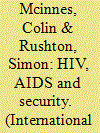

|
|
|
|
|
| Publication |
2010.
|
| Summary/Abstract |
HIV/AIDS is one of the greatest single causes of death and suffering on the planet. Over the last decade the societal impact of HIV/AIDS has been widely discussed in terms of national and international security. This article assesses the securitizing move and suggests that HIV/AIDS was only partially securitized at best and both the political consensus and strength of evidence were overestimated. It argues for greater nuance in our understanding of the link between HIV/AIDS and security, and the effects of its securitization, suggesting that neither is straightforward, and both are subject to case sensitivities.
|
|
|
|
|
|
|
|
|
|
|
|
|
|
|
|
| 9 |
ID:
068640
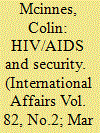

|
|
|
| 10 |
ID:
002179
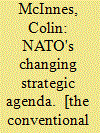

|
|
|
|
|
| Publication |
London, Unwin and Hyman, 1990.
|
| Description |
xx, 201p.
|
| Standard Number |
004445211X
|
|
|
|
|
|
|
|
|
|
|
|
Copies: C:1/I:0,R:0,Q:0
Circulation
| Accession# | Call# | Current Location | Status | Policy | Location |
| 033263 | 355.0310943/MCI 033263 | Main | On Shelf | General | |
|
|
|
|
| 11 |
ID:
048791
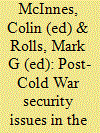

|
|
|
|
|
| Publication |
London, Frank Cass, 1994.
|
| Description |
197p.
|
| Standard Number |
0714645745
|
|
|
|
|
|
|
|
|
|
|
|
Copies: C:1/I:0,R:0,Q:0
Circulation
| Accession# | Call# | Current Location | Status | Policy | Location |
| 039094 | 355.03305/MCI 039094 | Main | On Shelf | General | |
|
|
|
|
| 12 |
ID:
025344
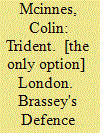

|
|
|
|
|
| Publication |
London, Brassey's Defence Publishers, 1986.
|
| Description |
xv, 235p.
|
| Standard Number |
0080335993
|
|
|
|
|
|
|
|
|
|
|
|
Copies: C:2/I:0,R:0,Q:0
Circulation
| Accession# | Call# | Current Location | Status | Policy | Location |
| 026993 | 359.83/MCI 026993 | Main | On Shelf | General | |
| 028152 | 359.83/MCI 028152 | Main | On Shelf | General | |
|
|
|
|
| 13 |
ID:
023738
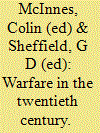

|
|
|
|
|
| Publication |
Boston, Unwin Hyman, 1988.
|
| Description |
xiv, 239p.
|
| Standard Number |
0043550347
|
|
|
|
|
|
|
|
|
|
|
|
Copies: C:1/I:0,R:0,Q:0
Circulation
| Accession# | Call# | Current Location | Status | Policy | Location |
| 030256 | 355.02/MCI 030256 | Main | On Shelf | General | |
|
|
|
|
| 14 |
ID:
142430
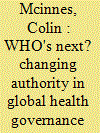

|
|
|
|
|
| Summary/Abstract |
The World Health Organization (WHO) occupies a central place in the system of global health governance and plays a key role in the control of epidemics and pandemics. The 2014 Ebola crisis in West Africa, however, saw widespread and sustained criticism of its performance, leading many to call for its reform and even replacement. This article moves on from initial analyses of the WHO's ‘failure’, to argue that the crisis has led to a shift in its authority as a global governor. It argues that the WHO's traditional basis of authority was largely expert and delegated; that it provided technical advice and normative guidance, and that its authority was ‘on loan’ from member states, who exerted considerable influence over the WHO. Its actions during the West African Ebola outbreak remained consistent with this, but it was unable to cope with what the outbreak required. The criticisms both of the WHO and the wider system of global health governance, however, have opened up a space where the balance of authority is shifting to one based more heavily on capacity—the ability to act in a crisis. If such a shift is realized, it will create different expectations of the WHO which, if they are not fulfilled, may lead to trust in the organisation declining and its legitimacy being compromised.
|
|
|
|
|
|
|
|
|
|
|
|
|
|
|
|
|
|
|
|
|